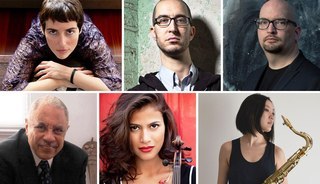|
Back
Dreams, Soft Booms and Quiet Ragtime New York
Zankel Hall,Carnegie Hall
04/06/2018 -
“Dreamscapes”
Hitomi Oba: September Coming (World Premiere revised version)
Ethan Iverson: Concerto to Scale (World Premiere)
Steve Lehman: Ten Threshold Studies (World Premiere)
T.J. Anderson: Bahia, Bahia (New York premiere)
Clarice Assad: Dreamscapes (New York premiere)
Elena Urioste (Violin), Ethan Iverson (Piano)
American Composers Orchestra, George Manahan (Conductor, Music Director)

Clockwise from top left: C. Assad, S. Lehman, E. Iverson, T.J. Anderson, E. Urioste, H. Oba
Two concerts of contemporary music book-ended this first week of April, and they couldn’t be more different.
On Monday, Esa-Pekka Salonen hosted a group of New York Philharmonic musicians at “Contact!”, playing music from young Russian composers. The venue at National Sawdust was, like the music, far from the center of the ordinary. For these were pieces that cusped on inanity, mysticism, electronic waste (conductor Jeffrey Milarsky held captive by sensor-wires). Rarely viscerally inspiring, but never boring.
Last night, back in the comfort of Carnegie Hall, the equally esteemed musicians of the American Composers Orchestra gave a quintet of nominally jazz-inspired compositions, hosted by the equally mesmeric ACO Artistic Director, Derek Bermel, and conducted by George Manahan. This music, though, was rarely disconcerting. Rather, it was affable, appealing and...well, comfortable.
The “jazz” inspiration was mainly peripheral, though most of the composers are jazz performers in their own right. In fact, Ethan Iverson’s Concerto to Scale (ACO commission) gave him the opportunity to perform, and he is a very very smooth operator on the keyboard. The beginning was probably jazzy in a sense. But it had the aura of lightweight Gallic music, the stuff of Poulenc and Ibert. The strings and piano complemented each other, Mr. Iverson roamed up and down the keyboard (standing up several times as if to award his own expertise).

G. Manahan, J. Saporito
Giving the work an identity was James Saporito playing a big fat bass drum. Nothing showy, just playing in time, marking out the accents. And making it fun.
The second movement was a kind of slow elevator-music, but the final rondo was a ragtime festival, a delight for Iverson, Manahan, orchestra and Mr. Saporito.
The opening September Crossing by California sax player Hitomi Oba was equally delightful, with two separate sections. The first obsessed with a minor-third interval, and with endless variations on those single notes, expanding, heading up and down syncopatedly, and then segueing into a orchestral section that whizzed by, with bird-chirps, delicious contrasts from the different consorts and finishing calmly. Six minutes simply wasn’t enough for a composer who obviously has much to say.
The only composer not present was the revered teacher-composer T.J. Anderson, now 90 years old, busily composing in Atlanta. I had only heard of him previously as the man who orchestrated–quite brilliantly–Scott Joplin’s opera, Treemonisha, yet he is widely recognized for his eclectic styles.
Bahia, Bahia, based on visits to Brazil, had some tough competition. His own teacher, Darius Milhaud, had written works from Brazil which not only captured the country, but gave it pulse and impulsiveness. Mr. Anderson’s work, written 28 years ago, was spotty, never drifted but I never felt coherence in the variegated orchestral sections. Perhaps I was looking for Brazil, but except for some vaguely Latin tempos, Bahia, Bahia never found its focus.
The second solo work was played with ravishing violin sounds by Elena Urioste. Clarice Assad’s Dreamscapes seemed to have been composed with Ms. Urioste’s sounds in mind.
All five works had extensive program notes, and Ms. Assad detailed about her recent dreams. About falling asleep, falling into deeper sleep, losing control, going into passion and nightmares. The concept of dreams is a common one with composers, as it should be. After all, inspiration itself comes from the unconscious. And if a composer doesn’t allow uncontrollable feelings, well, that composer better stick to academia.
Ms. Assad’s Dreamscape was indeed dreamy. One could make out all the sections of a night’s dream if necessary. Yet the effect was that of a rhapsody or wordless poem, rather than a the adventures of a revery.
The start could have been written by Samuel Barber. Conservatively romantic, quiet, then slowly swelling into those rhapsodic moments which Ms. Urioste played so well. Perhaps one shouldn’t have read the introductory notes and listened to the pure beauty and excellence of composition.
My favorite work by far was Steve Lehman’s Ten Threshold Studies (ACO commission). An alternative title could have been Sinfonia of Hushed Sforzandos. Throughout the entire too-short 11 minutes, timpani and piano produced a semi-muted “Boom”, after which the orchestra would perform transitions, elastic rhythms, melodies broken off by the same “Boom” after which they would go into strange harmonies, altered rhythms (yes, peripherally jazzy), building up to a boom-less ending with vibraphone.
Mr. Lehman led us through a vernal series of paths, a flower garden of exotic species, with quick visions of skies, scurrying fauna, and a tapestry of demanding but never sophistical complexity.
Harry Rolnick
|